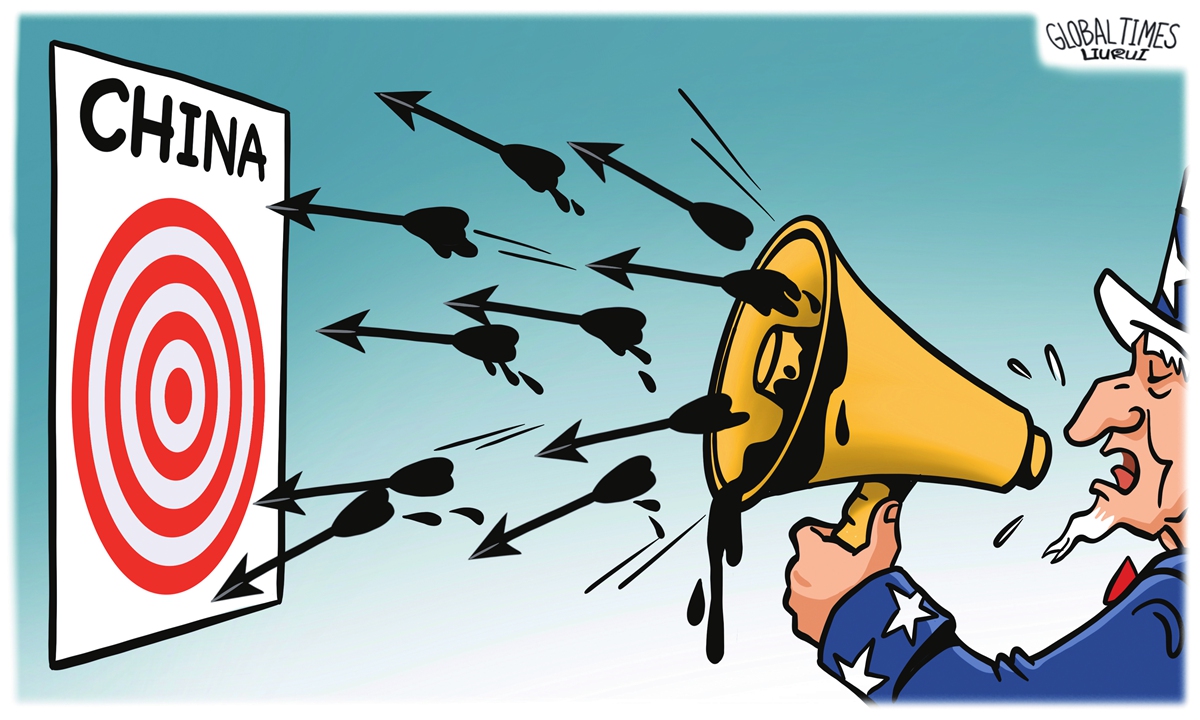
The hopeless fault-finder Illustration: Liu Rui/GT
On Monday, Chinese President Xi Jinping landed in Moscow for a three-day visit to Russia. The visit aimed to deal with the ongoing Ukraine crisis and how Beijing can help peacefully resolve the conflict.
The US has said that it would not support any cease-fire efforts in Ukraine and, furthermore, called China's peace proposal for Ukraine as overtly one-sided in favor of Moscow. It should be noted up front that Beijing's peace proposal demands significant concessions from Russia, which is obvious to anyone that has actually read it in full.
It is clear that the West, as analysts have been saying since the beginning of the conflict, wants to fight "until the last Ukrainian." That is to say that they do not want the Ukrainian government to accept any peace proposals under any circumstances and want a military conclusion, with attendant suffering and destitution, at all costs. They are completely unwilling to consider other countries' security interests, which is exactly what precipitated today's conflict in the first place.
Such thinking is antithetical to the very foundations of international law and basic human morality. On the other hand, China's peace proposal would introduce a political solution that would balance both sides' interests. And let us recall that when Beijing introduced its Middle East peace plan, it was met with equal disdain from the West and Western observers - however, it panned out into reality when Iran and Saudi Arabia, both perennial regional adversaries, reestablished diplomatic ties in a China-brokered deal.
Consider the events leading up to that breakthrough. Beijing had penned an extraordinary 25-year agreement with Iran that will see the two nations cooperate in a number of fields, including trade, economics and transportation. China is even conducting joint military exercises with Iran. And at the same time, President Xi Jinping signed over 20 initiatives, including a strategic partnership agreement that will harmonize the Saudi Kingdom's Vision 2030 with China's Belt and Road Initiative (BRI), all valued at a cool $29 billion.
The clear reason why neither Tehran nor Riyadh felt apprehension about Beijing's dealings with its adversary is China's proven record of not starting wars, not invading other countries and not interfering in the affairs of sovereign nations. Despite the fact that Russia and China enjoy a comprehensive strategic partnership, described as a "no-limits" partnership, China is heavily invested in Ukraine and sees it likewise as a key partner.
Some Western media outlets had speculated that Beijing has a role in the Ukraine conflict. For example, when Russia's special military operation began, they claimed that either China knew about it and failed to stop it or had an interest in the conflict - both of which are false. They also believe China's peace proposal is lopsided in favor of Russia.
It's true that China and Russia have an obvious partnership, as they have a long-shared border and extensive trade relations. However, China and Ukraine also have deep economic ties. In 2019, China became Ukraine's single largest trading partner, providing 14.4 percent of its imports and serving as a destination for 15.3 percent of its exports in 2020.
Infrastructure and development are major areas of interest for China in Ukraine. China's largest agricultural conglomerate, COFCO Group, built a $75 million grain and oil transfer terminal at Mykolaiv port on the Black Sea in 2016 - one year before it joined the BRI. The following year, Chinese engineers helped upgrade the Yuzhny port near Odesa, which is Ukraine's principal international port. Two Chinese companies also won public tenders to build Kiev's fourth metro line that same year. In total, the two signed some $3 billion in infrastructure-related contracts since 2017.
Likewise, China and Ukraine have extensive cooperation on renewable energy projects. The China National Building Material company already financed half the country's existing solar power capacity, owning 10 solar plants, but plans for the future are even more ambitious. For example, PowerChina's 1$ billion wind farm project will see the construction of Europe's largest onshore wind facility. There's also a solar power array being built by China Machinery Engineering Corporation that will be Europe's third-largest.
Finally, Ukraine hopes to become "a bridge to Europe for Chinese business," which were the words of Ukrainian President Volodymyr Zelensky in his first phone conversation with Chinese President Xi Jinping in 2021. This is because of the fact that Ukraine has a free trade agreement with the European Union (EU), and China is both Ukraine's and the EU's largest trading partner. However, China and the EU do not have a free trade agreement, meaning Ukraine is a transit destination for Chinese goods to the EU.
It is for these reasons that insinuating China is wooing one side's interests is ridiculous, when China has a number of tangible assets in Ukraine and needs Kiev for access to one of its largest markets. China's cooperation with both sides actually makes it even more dependable in terms of brokering a compromise, and that was fully demonstrated in the recent diplomatic breakthrough between Iran and Saudi Arabia. On the other hand, it is clear to see that the West is the party with an interest in fanning the flames of war - evidenced both by word and deed.
The author is a Prague-based American journalist, columnist and political commentator. opinion@globaltimes.com.cn




